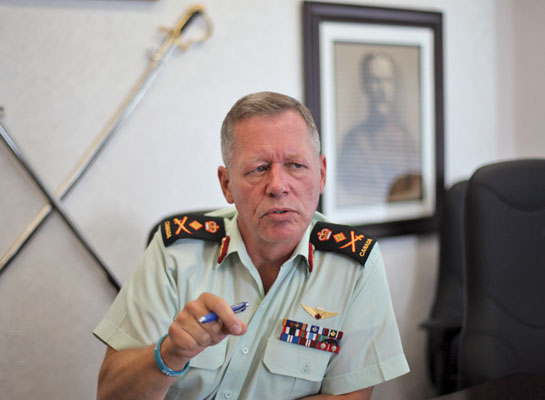
Canadian, American and Latvian soldiers get a briefing during training in Germany in March. [M.CPL. Jennifer Kusche/Combat Camera]
After 13 years fighting a war in Afghanistan, Canadian soldiers have come full circle, returning to the once-familiar climes of Europe to join efforts to discourage Moscow’s growing aggression.
Canada recently renewed a military training commitment in Ukraine, where Russian President Vladimir Putin annexed Crimea and gave tacit support to rebels in 2014. And it is leading a NATO battle group in Latvia, one of four the alliance is mounting in Baltic states. The others are in Estonia, Lithuania and Poland.
Latvia and the other states first annexed by the former Soviet Union during the Second World War are widely seen as coveted prizes to Putin. They would provide access to key ports, expand influence, and restore Kremlin pride and hegemony.
Latvia, along with Estonia and Lithuania, emerged from behind the Iron Curtain in the late 1980s via a near-bloodless revolution. Poland had its own revolt, and all have thrived since regaining their independence in the early 1990s.

Chief of the Defence Staff General Jonathan Vance. [Adam Day/Legion Magazine]
“The resurgence of a belligerent Russia that is using other-than-recognized international norms to achieve political objectives is worrying,” he said. “I think that this will be an effort that will go on for some time.”
Indeed, in recent weeks Putin has served up bitter reminders that all is not well on the European continent.
On March 24, Denis Voronenkova, a former Russian lawmaker and Putin opponent, was assassinated in a Kiev street. Voronenkova had compared modern Russia to Nazi Germany, called the annexation of Crimea illegal and renounced his Russian citizenship. He was testifying at the in-absentia treason trial of Ukraine’s former Moscow-aligned president, Viktor Yanukovych, who is now living in Russia.
It was the second assassination bearing Kremlin hallmarks in less than a week—public, bloody, a statement—and it came one day before Putin met with Marie Le Pen, leader of France’s far-right Front National. Running in a bellwether presidential election later this month, Le Pen has publicly backed the Russian annexation of Crimea and frequently expressed admiration for Putin.
If the suggestion of political assassinations on foreign soil is not enough, Putin’s apparent meddling in the affairs of foreign states has raised concerns. New analysis by an American think tank says Putin is behind much of the anti-immigrant, anti-establishment sentiment in Europe and is seen as contributing momentum to right-wing politics across the continent, in Britain and across the Atlantic.
In the Netherlands, far-right politician Geert Wilders was dealt a surprise defeat in an early-March election, but few saw it as a tide-turner. Besides France, the far-right will figure in elections in Germany, Italy and Bulgaria over the next year.
The paper by the left-leaning Center for American Progress, entitled Russia’s Fifth Column, asserts that Putin has set out to create nothing less than a new world order that would boost his power, reduce U.S. influence, reshape democracy and replace liberalism with ultra-conservatism.

On his visit to Riga last October, Minister of National Defence Harjit Sajjan received a hockey jersey representing Latvia. [Cpl Gabrielle DesRochers/Combat Camera]
In exchange for adherence to Russian interests, the paper says, Putin’s efforts in Europe have served to elevate the profiles of far-right leaders through disinformation, propaganda, illicit financing and “covert influence operations.”
Europe’s far-right “now operate[s] as a fifth column that is undermining the Western liberal order from within.” The paper cites case examples involving the Front National, Wilders’ Party for Freedom, Germany’s Alternative für Deutschland, Austria’s Freedom Party, the U.K. Independence Party and others.
Vance called Russia “a big strategic threat,” a nuclear-arms state that is “thwarting not only international norms but common decency.”
“Their behaviour is bad, not just in eastern Europe,” he said. “Their behaviour is bad elsewhere, too…and I suspect if their behaviour doesn’t change, they will provide a long-term strategic problem.”
While meeting with Le Pen, Putin said that Russia had no intention of meddling in the French vote. “We do not want to influence events in any way, but we retain the right to meet with all the different political forces, just like our European and American partners do.”
Le Pen called herself “a totally free woman.”
“I don’t want to be under the yoke of the U.S. I don’t want to be under the yoke of Russia,” she said. “We are in a period where conspiracy theories appear to be very much in fashion. As soon as something goes wrong, it’s Russia’s fault. This makes me smile.”
Advertisement



















